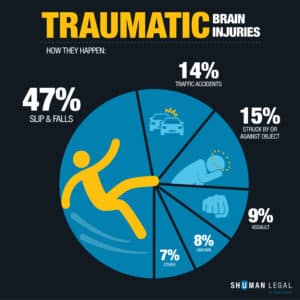Key Takeaways
- Medical negligence in brain injuries occurs when healthcare providers fail to meet accepted care standards, leading to severe consequences.
- Common causes of brain injuries from medical negligence include surgical errors, medication mistakes, and childbirth negligence, each potentially resulting in lasting harm.
- Victims of brain injury medical negligence have legal recourse to seek compensation for damages, including medical expenses and pain and suffering.
Your search for help ends here. Let’s get started, for FREE.
Understanding Brain Injury Medical Negligence: Key Causes and Effects
Medical negligence in brain injuries happens when healthcare providers do not meet the accepted standard of care, causing severe consequences for the patient. Professionals must deliver adequate care, and any failure can lead to catastrophic outcomes.
Brain injuries from medical negligence can have widespread effects, impacting physical, cognitive, and emotional well-being. Recognizing the causes and effects is the first step towards seeking justice and addressing such negligence.
Introduction
The injured party or their family can initiate legal action if a brain injury results from negligence or misconduct. Brain injury medical negligence involves injuries caused by healthcare professional’s negligence or misconduct.
In many cases, these injuries are preventable and occur because of medical errors, such as failure to monitor oxygen supply during surgery, improper handling of a blood clot, or negligence during childbirth leading to issues like umbilical cord complications. These internal factors, among others, can cause significant brain damage if not addressed promptly and correctly.
Grasping the intricacies of brain injury medical negligence is essential. Recognizing the signs and knowing the proper steps helps victims and their families seek justice. This knowledge empowers and helps prevent similar incidents.
What Constitutes Medical Negligence?
 Medical negligence happens when healthcare providers do not maintain the accepted standard of care, causing injuries from errors or omissions. Medical professionals must provide adequate care, and any deviation is classified as negligence. Proving malpractice requires showing that the provider’s actions deviated from accepted standards.
Medical negligence happens when healthcare providers do not maintain the accepted standard of care, causing injuries from errors or omissions. Medical professionals must provide adequate care, and any deviation is classified as negligence. Proving malpractice requires showing that the provider’s actions deviated from accepted standards.
A malpractice case hinges on proving that the healthcare provider, as a medical professional, lacked adequate skill, care, and knowledge, causing harm in medical malpractice cases. This can involve surgical mistakes, medication errors, or other negligence. The failure to meet the standard of care must be directly linked to the patient’s injury for a successful claim.
Compensation for brain injuries caused by medical malpractice can include economic damages like medical expenses and lost wages, as well as non-economic damages for pain and suffering. Grasping these aspects is crucial for anyone considering legal action in a malpractice case.
Types of Brain Injuries from Medical Negligence
Brain injuries from medical negligence fall into two categories: traumatic and non-traumatic. Traumatic brain injuries (TBI) result from direct head impacts or misuse of delivery instruments during childbirth, leading to brain injuries resulting from these incidents. These injuries range from mild cognitive issues to severe outcomes like coma or death, often caused by head impacts or penetration by objects.
Hypoxic brain injuries result from reduced oxygen supply, while anoxic injuries occur due to total oxygen deprivation. These can be caused by anesthesia errors, stroke misdiagnoses, and untreated brain infections. Restricted oxygen supply can have devastating effects, leading to hypoxic brain injury.
Non-traumatic brain injuries are linked to conditions like tumors, infections, or insufficient blood flow, resulting from diseases, aneurysms, or other internal factors. Recognizing the distinction is essential for medical treatment and legal proceedings.
Birth trauma significantly causes brain injuries. Improper delivery practices, like misuse of forceps, can severely damage infants. Childbirth negligence, such as not monitoring fetal distress, can lead to birth asphyxia and permanent brain damage due to insufficient oxygen.
Suffered a Brain Injury?
Common Causes of Brain Injuries Due to Medical Negligence
Inadequate surgical monitoring can cause oxygen deprivation and brain injury. Surgical errors, like accidental brain tissue damage, often result from inattention or lack of preparation, leading to irreversible harm.
Medication errors, such as wrong dosages or incorrect medications, can cause life-threatening brain injuries. Anesthesia administration mistakes can also lead to dangerous complications, including brain injuries.
Childbirth-related negligence commonly causes brain injuries. Improper delivery practices, like forceps misuse, can severely harm infants. Failing to monitor fetal distress can result in birth asphyxia and permanent brain damage due to insufficient oxygen. Inadequate monitoring during childbirth often leads to complications and brain injuries.
Symptoms of Brain Injuries Caused by Medical Malpractice
Brain injuries can severely impact physical, cognitive, and emotional health in the long term. Cognitive difficulties may include memory, attention, learning, and reasoning issues. Common symptoms include persistent headaches, memory loss, and cognitive impairment.
Motor function challenges, such as paralysis or coordination problems, are common. Physical disabilities from a brain injury can greatly affect quality of life. Emotional instability may lead to personality shifts, mood variations, and irritability.
Persistent pain and fatigue can linger long after the initial injury, making daily activities a struggle. Early recognition of these symptoms is crucial for seeking appropriate treatment and legal recourse.

Legal Recourse for Brain Injury Victims
Legal action helps brain injury victims seek justice and compensation. Addressing medical negligence in court prevents similar incidents and holds healthcare providers accountable, leading to improved medical practices and patient safety.
Consulting experienced attorneys provides victims clarity on their legal standing and potential compensation. This step is crucial for understanding the case complexity and navigating the legal landscape effectively.
Proving a Medical Malpractice Case
The first step in establishing medical malpractice is demonstrating a legal duty between the doctor and the patient.
It must be shown that the provider’s actions deviated from accepted standards, proving the physician breached their duty by not meeting the community’s standard of care.
A malpractice claim requires establishing a direct link between the doctor’s breach of duty and the patient’s injury. Verifying that damages exist is necessary to pursue a medical malpractice case, as claims are void if no harm was incurred.
Recoverable Damages in Brain Injury Claims
Victims of brain injuries from medical negligence can seek compensation for medical expenses, lost wages, and pain and suffering. Ongoing medical treatment and support may be needed, and brain injuries can severely impact physical, cognitive, and emotional health, influencing the amount of damages awarded.
In negligence cases, punitive damages may be awarded if the defendant’s conduct is particularly egregious. These damages punish the wrongdoer and deter similar behavior, providing a sense of justice to the victims.
Real-Life Cases of Brain Injuries from Medical Negligence
A child born with brain damage due to medical negligence received a structured settlement for lifelong care after the doctor ignored signs of distress. This case highlights the importance of timely and accurate medical interventions to prevent such tragedies.
A 16-year-old girl received $1.45 million after suffering a traumatic brain injury in a car crash. In another case, a woman received $3.4 million after a brain injury from a semi-truck collision.
These real-life cases illustrate the devastating impact of brain injuries and the importance of legal action to secure compensation and justice for victims. Medical negligence can cause irreversible brain damage, and many have suffered brain damage, significantly diminishing quality of life.
How to Choose the Right Attorney
Selecting an experienced malpractice attorney increases the likelihood of a favorable outcome for brain injury victims. Shuman Legal is a top-rated malpractice attorney in Chicago, Illinois. We operate on a contingency fee basis, earning a percentage of the settlement, ensuring victims can seek justice without upfront financial burdens.
Frequently Asked Questions
What is medical negligence in the context of brain injuries?
Medical negligence in the context of brain injuries refers to a healthcare provider’s failure to adhere to accepted standards of care, resulting in harm or injury to the patient’s brain. Such negligence can have serious consequences for the affected individual.
What are the common causes of brain injuries due to medical negligence?
Brain injuries due to medical negligence often stem from surgical errors, medication mistakes, and insufficient monitoring during childbirth or surgical procedures. Addressing these risks is crucial to prevent potential harm to patients.
What symptoms indicate a brain injury caused by medical malpractice?
Symptoms indicating a brain injury from medical malpractice include persistent headaches, memory loss, cognitive impairment, motor function difficulties, and emotional instability. If you experience these symptoms following medical treatment, it is crucial to seek evaluation.
How can victims of brain injuries seek legal recourse?
Victims of brain injuries should consult experienced attorneys to assess their legal options and pursue compensation for their damages. This step is crucial for understanding rights and potential recourse.
What types of damages can be recovered in brain injury claims?
In brain injury claims, victims can recover economic damages such as medical expenses and lost wages, non-economic damages for pain and suffering, and potentially punitive damages if the conduct is particularly egregious.












